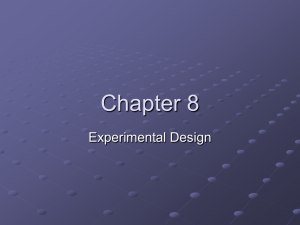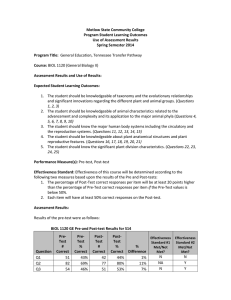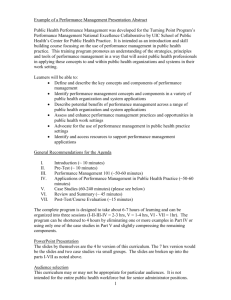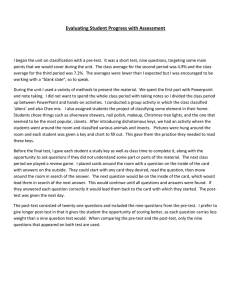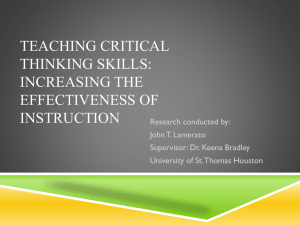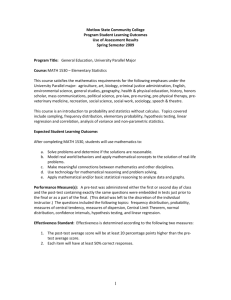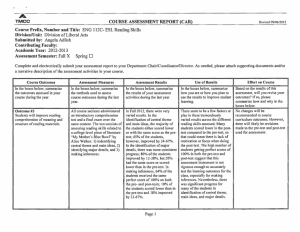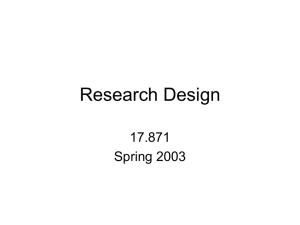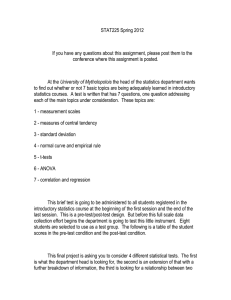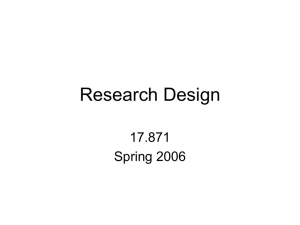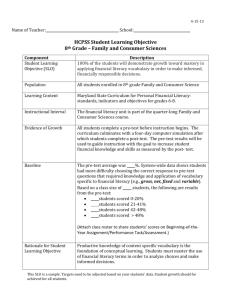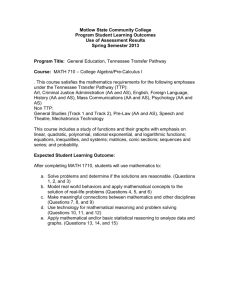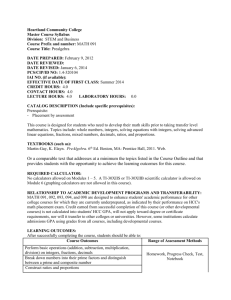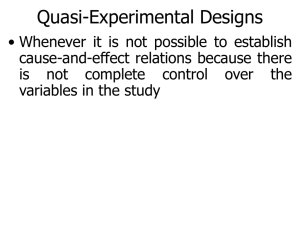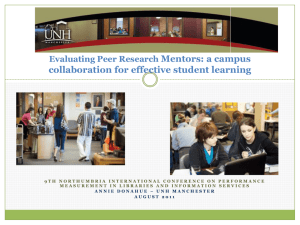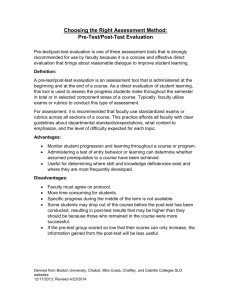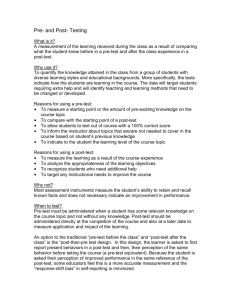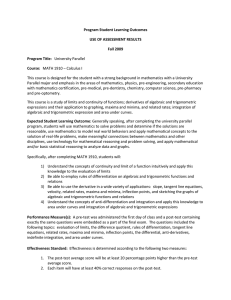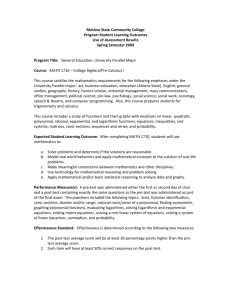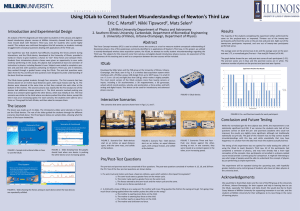BIOL 1120
advertisement
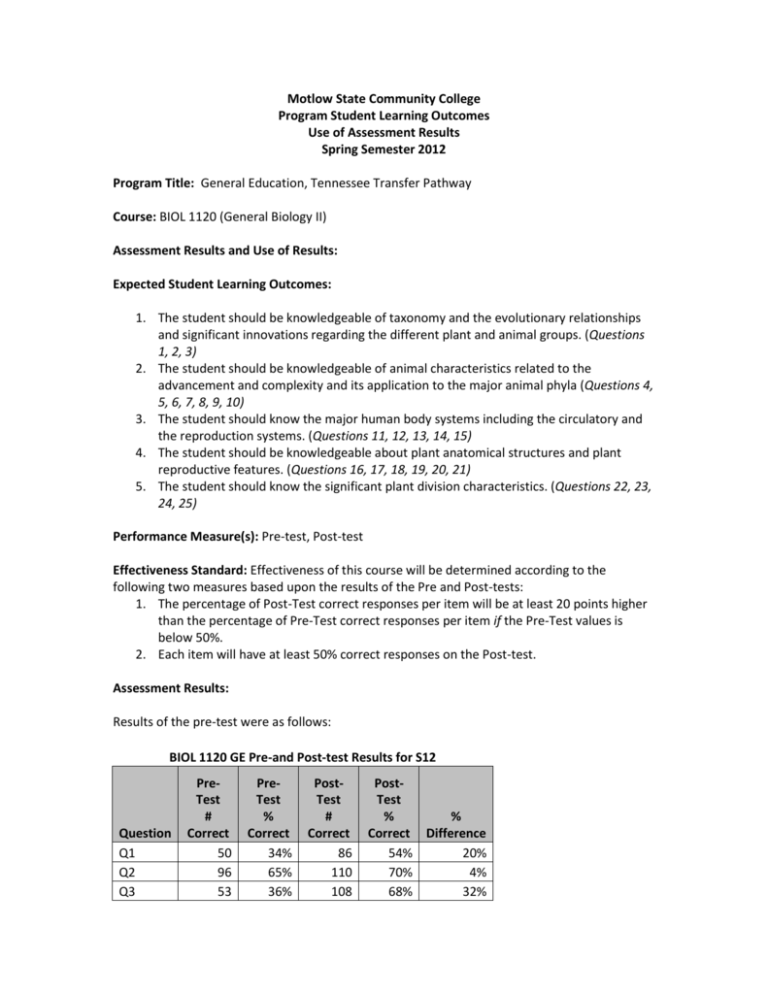
Motlow State Community College Program Student Learning Outcomes Use of Assessment Results Spring Semester 2012 Program Title: General Education, Tennessee Transfer Pathway Course: BIOL 1120 (General Biology II) Assessment Results and Use of Results: Expected Student Learning Outcomes: 1. The student should be knowledgeable of taxonomy and the evolutionary relationships and significant innovations regarding the different plant and animal groups. (Questions 1, 2, 3) 2. The student should be knowledgeable of animal characteristics related to the advancement and complexity and its application to the major animal phyla (Questions 4, 5, 6, 7, 8, 9, 10) 3. The student should know the major human body systems including the circulatory and the reproduction systems. (Questions 11, 12, 13, 14, 15) 4. The student should be knowledgeable about plant anatomical structures and plant reproductive features. (Questions 16, 17, 18, 19, 20, 21) 5. The student should know the significant plant division characteristics. (Questions 22, 23, 24, 25) Performance Measure(s): Pre-test, Post-test Effectiveness Standard: Effectiveness of this course will be determined according to the following two measures based upon the results of the Pre and Post-tests: 1. The percentage of Post-Test correct responses per item will be at least 20 points higher than the percentage of Pre-Test correct responses per item if the Pre-Test values is below 50%. 2. Each item will have at least 50% correct responses on the Post-test. Assessment Results: Results of the pre-test were as follows: BIOL 1120 GE Pre-and Post-test Results for S12 Question Q1 Q2 Q3 PreTest # Correct 50 96 53 PreTest % Correct 34% 65% 36% PostTest # Correct 86 110 108 PostTest % % Correct Difference 54% 20% 70% 4% 68% 32% Q4 Q5 Q6 Q7 Q8 Q9 Q10 Q11 Q12 Q13 Q14 Q15 Q16 Q17 Q18 Q19 Q20 Q21 Q22 Q23 Q24 Q25 81 52 115 32 49 45 96 94 134 75 62 40 53 34 20 49 56 109 90 40 59 49 55% 35% 78% 22% 33% 31% 65% 64% 91% 51% 42% 27% 36% 23% 14% 33% 38% 74% 61% 27% 40% 33% 129 114 151 91 114 68 115 112 152 92 87 59 61 94 53 114 107 143 129 95 103 101 82% 72% 96% 58% 72% 43% 73% 71% 96% 58% 55% 37% 39% 59% 34% 72% 68% 91% 82% 60% 65% 64% 27% 37% 17% 36% 39% 12% 7% 7% 5% 7% 13% 10% 3% 36% 20% 39% 30% 16% 20% 33% 25% 31% One hundred forty-seven students took the pre-test and158 students took the post-test. The average of the pre-test scores was 43% and the average of the post-test scores was 66%, Assessment results showed a 23 percent point gain from pre-test to post-test, thus meeting the effectiveness standard that the post-test average score be at least 20 percent points higher that the pre-test average score. The effectiveness standard that each item will have at least 50% correct responses on the posttest was met by all problems except questions 9, 15, 16 and 18, which more than 50% of the students answered incorrectly. Question 9 concerns animal characteristics, question 15 concerns human circulatory and reproductive systems, and questions 16 and 18 concern plant anatomical structures and reproductive features. Question 9 concerning animal characteristics was also a question that did not meet the expectation of getting at least 50% correct responses on the post test in 2010. This question on the test needs to be reexamined by the science faculty. The reproductive systems of plants and humans did not fare well on the test either. Faculty will begin to put more emphasis on this area so that when BIOL 1120 is assessed in spring 2014, according to the assessment cycle, gains will be made in student learning. All questions on the test will be reexamined by a committee from the science department to make sure they all meet the expectations of the department. Use of Assessment Results: During the Math& Science Departmental meeting at the Fall Assembly on August 20, 2012, the science faculty discussed question 9 and the concerns they had with the question not gaining the expectations on student learning yet again. This question failed the expectations in 2010 and in 2012. The faculty will create a committee to evaluate all the questions on the exam. This will assure that the question meets the standards of the department. The other questions all relate to the reproductive systems of plants and humans. Discussions arose on whether the questions need to be analyzed, or more emphasis needs to be put on that area. It was finally agreed that both should be done.
